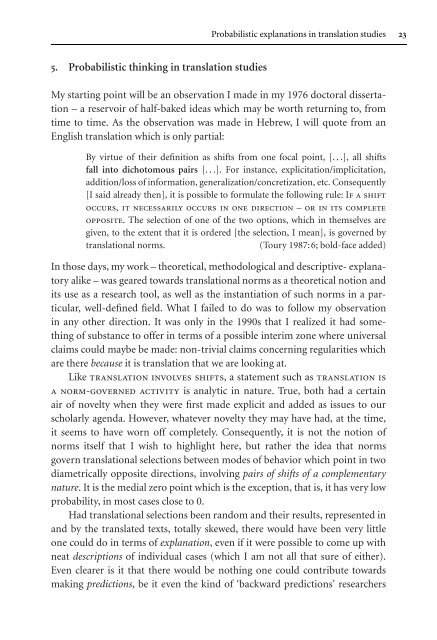Translation Universals.pdf - ymerleksi - home
Translation Universals.pdf - ymerleksi - home
Translation Universals.pdf - ymerleksi - home
Create successful ePaper yourself
Turn your PDF publications into a flip-book with our unique Google optimized e-Paper software.
Probabilistic explanations in translation studies 23<br />
5. Probabilistic thinking in translation studies<br />
My starting point will be an observation I made in my 1976 doctoral dissertation<br />
– a reservoir of half-baked ideas which may be worth returning to, from<br />
time to time. As the observation was made in Hebrew, I will quote from an<br />
English translation which is only partial:<br />
By virtue of their definition as shifts from one focal point, [. . .], all shifts<br />
fall into dichotomous pairs [. . .]. For instance, explicitation/implicitation,<br />
addition/loss of information, generalization/concretization, etc. Consequently<br />
[I said already then], it is possible to formulate the following rule: If ashift<br />
occurs, it necessarily occurs in one direction – or in its complete<br />
opposite. The selection of one of the two options, which in themselves are<br />
given, to the extent that it is ordered [the selection, I mean], is governed by<br />
translational norms.<br />
(Toury 1987:6; bold-face added)<br />
In those days, my work – theoretical, methodological and descriptive- explanatory<br />
alike – was geared towards translational norms as a theoretical notion and<br />
its use as a research tool, as well as the instantiation of such norms in a particular,<br />
well-defined field. What I failed to do was to follow my observation<br />
in any other direction. It was only in the 1990s that I realized it had something<br />
of substance to offer in terms of a possible interim zone where universal<br />
claims could maybe be made: non-trivial claims concerning regularities which<br />
are there because it is translation that we are looking at.<br />
Like translation involves shifts, a statement such as translation is<br />
a norm-governed activity is analytic in nature. True, both had a certain<br />
air of novelty when they were first made explicit and added as issues to our<br />
scholarly agenda. However, whatever novelty they may have had, at the time,<br />
it seems to have worn off completely. Consequently, it is not the notion of<br />
norms itself that I wish to highlight here, but rather the idea that norms<br />
govern translational selections between modes of behavior which point in two<br />
diametrically opposite directions, involving pairsofshiftsofacomplementary<br />
nature. It is the medial zero point which is the exception, that is, it has very low<br />
probability, in most cases close to 0.<br />
Had translational selections been random and their results, represented in<br />
and by the translated texts, totally skewed, there would have been very little<br />
one could do in terms of explanation, even if it were possible to come up with<br />
neat descriptions of individual cases (which I am not all that sure of either).<br />
Even clearer is it that there would be nothing one could contribute towards<br />
making predictions, be it even the kind of ‘backward predictions’ researchers
















